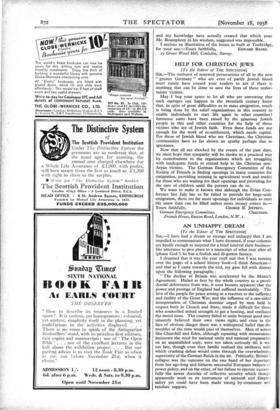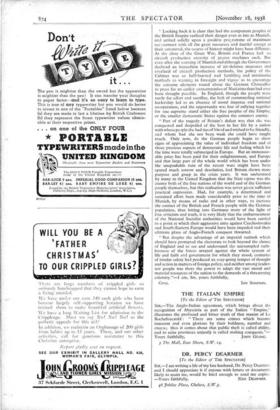AN UNHAPPY DREAM
[To the Editor of THE SPECTATOR] SIR,—I have had a dream so strange and unhappy that I am impelled to communicate what I have dreamed, if your columns are kindly enough to suspend for a brief interval their business- like utterance to give place to a transcript of what may after all (please God !) be but a foolish and ill-gotten fantasy.
I dreamed that it was the year 1958 and that I was turning over the pages of a school history book—I think American— and that as I came towards the end, my gaze fell with dismay upon the following paragraphs : " The decline of Britain was accelerated by the Munich Agreement. Hailed at first by the whole country as a provi- dential deliverance from war, it soon became apparent that the power and prestige of England had suffered incalculably. The love of the people for peace arising as a reaction to the sufferinz and futility of the Great War, and the influence of a one-sided interpretation of Christian doctrine urged by men held in respect both in Church and State, made it difficult for those who counselled armed strength to get a hearing, and confused the moral issue. The country failed to unite because good men sincerely believed their own views right, and even in the face of obvious danger there was a widespread belief that the troubles of the time would pass of themselves. Men of action like Churchill and Eden, although repeating with monotonous insistence the need for national unity and national preparation on an unparalleled scale, were not taken seriously till it was too late, though even they hardly realised the swiftness with which crushing defeat would come through the overwhelmin7, superiority of the German Reich in the air. Politically, Britain's collapse was the outcome on the one hand of her departur,! from her age-long and hitherto successful European balance of power policy, and on the other, of her failure to operate success- fully the newer doctrine of collective security which though apparently weak as an instrument of national and Empir.! safety yet could have been made strong by consistent and 'resolute support.
" Looking back it is clear that had the component peoples of the British Empire realised their danger even as late as Munich, and united solidly upon a positive prozramate of maximum reannament with all the great resources and martial energy at their command, the course of history might have been different. At the close of the Great War, Britain and France had an aircraft production capacity of 3o,000 machines each. But even after the warning of Munich and although the Government declared an immediate increase of air-defence measures and overhaul of aircraft production methods, -the policy of the Cabinet was so half-hearted and fumbling and ministerial methods so wanting in foresight and vigour as to encourage the extreme elements round about the German Chancellor to press for an earlier consummation of Nazi aims than had ever been thought possible. In England, though the people were ready for effort and sacrifice, the lack of commanding national leadership led to an absence of moral impetus and national co-operation, and the opportunity was lost of rallying together for one supreme stand either the free peoples of the Empire, or the smaller democratic States against the common enemy.
" Part of the tragedy of Britain's defeat was that she was conquered and despoiled of the best in her life by a nation with whose people she had ties of blood and wished to be friendly, and whom had she not been weak she could have taught much. Only now, do the German people begin to show signs of appreciating the value of individual freedom and of those precious aspects of democratic life and feeling which for the time were totally submerged in Europe. But an immeasur- able price has been paid for their enlightenment, and Europe and that large part of the whole world which has been under the unspeakable ruin of the recent wars might have been spared much sorrow and desolation, had Britain shown more purpose and grasp in the crisis years. It was understood by many in the United Kingdom that the Nazi regime was the enemy both of the free nations of the world and of the German people themselves, but this realisation was never given sufficient practical expression. Had, for example,' a determined and sustained effort been made considerably prior to the time of Munich, by means of radio and in other ways, to increase the contact of the British and French people with the German population, thus letting into Germany more of the light of free criticism and truth, it is very likely that the embarrassment of the National Socialist authorities would have been carried to a point at which their aggressive aims against Czechoslovakia and South-Eastern Europe would have been impeded and their ultimate plans of Anglo-French conquest thwarted.
" But despite the advantage of an imperial outlook which should have prompted the electorate to look beyond the shores of England and to see and understand the unexampled ruth- lessness of the forces arrayed against the whole system of life and faith and government for which they stood, centuries of insular safety had produced an easy-going temper of thought and action in matters of foreign policy, and neither among leaders nor people was there the power to adapt the vast moral and material resources of the nation to the demands of a threatening calamity:"—I am, Sir, yours faithfully,

























































 Previous page
Previous page